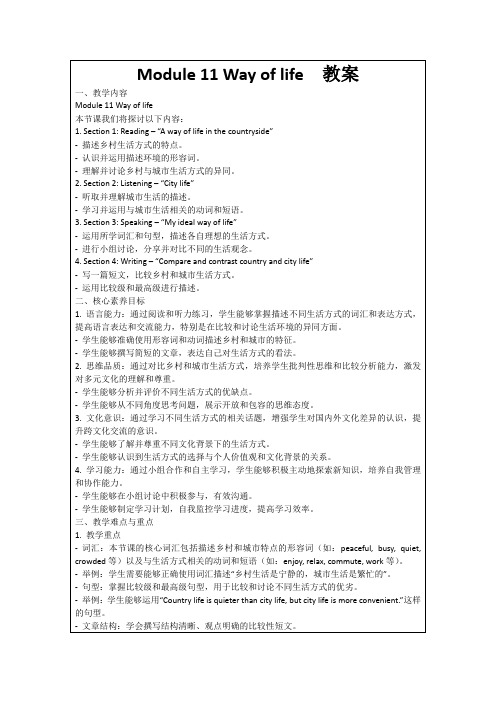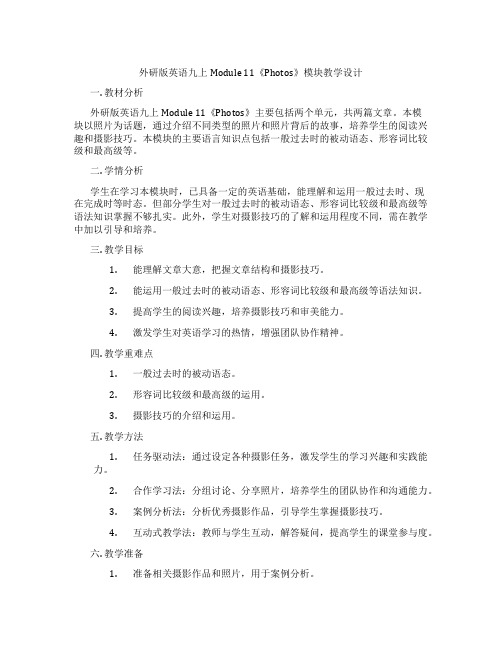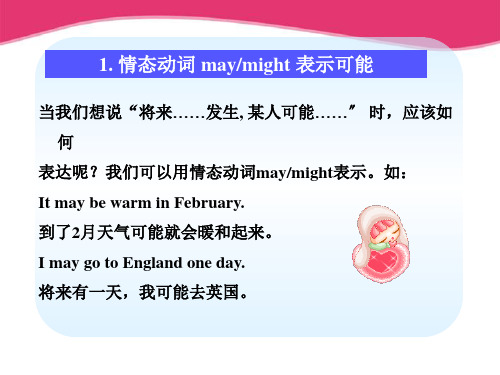Module11
Module11Wayoflife教案

-听力理解:在听力练习中,学生可能难以捕捉到快速口语中的关键信息。
-举例:在听力材料中,学生需要识别并理解描述城市生活节奏快、压力大等关键信息。
-文化差异认识:学生可能对其他文化背景下的生活方式缺乏足够的了解,难以进行深入的比较和分析。
在讲授过程中,我发现有些学生在听力环节遇到了一些困难,尤其是在捕捉细节信息方面。针对这个问题,我及时调整了教学方法,通过重复播放和逐步引导的方式,帮助学生逐步提高了听力理解能力。
此外,小组讨论环节也让我看到了学生们的合作精神和批判性思维能力。他们在探讨乡村与城市生活方式的优缺点时,能够从不同角度进行分析,并提出合理的观点。然而,也有部分小组在展示成果时,表达不够清晰,逻辑性有待提高。针对这一点,我计划在接下来的课程中,加强对学生表达能力的训练。
-文章结构:学会撰写结构清晰、观点明确的比较性短文。
-举例:学生能够按照引言、主体和结尾的结构,组织文章,表达个人观点。
2.教学难点
-词汇运用:学生可能难以在具体语境中灵活运用新学词汇,特别是在口语和写作中。
-举例:如何恰当选择并使用形容词来描述不同的生活场景。
-比差异。
3.成果分享:每个小组将选择一名代表来分享他们的讨论成果。这些成果将被记录在黑板上或投影仪上,以便全班都能看到。
(五)总结回顾(用时5分钟)
今天的学习,我们了解了乡村和城市生活方式的基本概念、重要性和影响。同时,我们也通过实践活动和小组讨论加深了对这些概念的理解。我希望大家能够掌握这些知识点,并在日常生活中灵活运用。最后,如果有任何疑问或不明白的地方,请随时向我提问。
3.成果展示:每个小组将向全班展示他们的讨论成果和角色扮演的结果。
外研版英语九上Module 11《Photos》模块教学设计

外研版英语九上Module 11《Photos》模块教学设计一. 教材分析外研版英语九上Module 11《Photos》主要包括两个单元,共两篇文章。
本模块以照片为话题,通过介绍不同类型的照片和照片背后的故事,培养学生的阅读兴趣和摄影技巧。
本模块的主要语言知识点包括一般过去时的被动语态、形容词比较级和最高级等。
二. 学情分析学生在学习本模块时,已具备一定的英语基础,能理解和运用一般过去时、现在完成时等时态。
但部分学生对一般过去时的被动语态、形容词比较级和最高级等语法知识掌握不够扎实。
此外,学生对摄影技巧的了解和运用程度不同,需在教学中加以引导和培养。
三. 教学目标1.能理解文章大意,把握文章结构和摄影技巧。
2.能运用一般过去时的被动语态、形容词比较级和最高级等语法知识。
3.提高学生的阅读兴趣,培养摄影技巧和审美能力。
4.激发学生对英语学习的热情,增强团队协作精神。
四. 教学重难点1.一般过去时的被动语态。
2.形容词比较级和最高级的运用。
3.摄影技巧的介绍和运用。
五. 教学方法1.任务驱动法:通过设定各种摄影任务,激发学生的学习兴趣和实践能力。
2.合作学习法:分组讨论、分享照片,培养学生的团队协作和沟通能力。
3.案例分析法:分析优秀摄影作品,引导学生掌握摄影技巧。
4.互动式教学法:教师与学生互动,解答疑问,提高学生的课堂参与度。
六. 教学准备1.准备相关摄影作品和照片,用于案例分析。
2.准备语法练习题,巩固所学知识。
3.准备课堂活动所需材料,如图片、卡片等。
4.安排课堂展示环节,准备展示平台。
七. 教学过程1.导入(5分钟)利用照片展示,引导学生谈论照片背后的故事,激发学生对本模块的兴趣。
2.呈现(10分钟)介绍模块内容,展示两篇文章,让学生初步了解文章大意。
3.操练(10分钟)针对文章中的重点语法知识,设计相关练习题,让学生分组讨论,巩固所学知识。
4.巩固(10分钟)邀请学生上台展示摄影作品,分享照片背后的故事,培养学生的表达能力和摄影技巧。
Module11Unit1Theytouchnoses!教案

(一)导入新课(用时5分钟)
同学们,今天我们将要学习的是Module 11 Unit 1 "They touch noses!"这一章节。在开始之前,我想先问大家一个问题:“你们在日常生活中是否遇到过不同的问候方式?”比如,握手、拥抱或碰鼻。这个问题与我们将要学习的内容密切相关。通过这个问题,我希望能够引起大家的兴趣和好奇心,我们一同探索不同文化中问候方式的奥秘。
3.发展学生的思维品质,通过对比分析不同文化现象,培养学生独立思考、批判性思维及解决问题的能力。
4.激发学生的学习兴趣,引导他们探索世界多元文化,增强学生的全球视野和文化意识。
5.培养学生的团队协作和表达能力,通过小组讨论、展示等活动,提升学生的合作沟通能力。
三、教学难点与重点
1.教学重点
-重点一:掌握不同文化问候方式的表达。如教材中的"They touch noses." "People shake hands."等句型,要求学生能够熟练运用。
Module 11 Unit 1 They touch noses!教案
一、教学内容
Module 11 Unit 1 They touch noses!本节课我们将聚焦于教材中关于不同文化背景下人们问候方式的内容。具体教学内容包括:
1.了解不同国家和地区的问候方式,如触摸鼻子、拥抱、握手等。
2.学习并运用目标语言描述各种问候动作,如"They touch noses." "People shake hands."等。
3.成果分享:每个小组将选择一名代表来分享他们的讨论成果。这些成果将被记录在黑板上或通过投影展示给全班。
(五)总结回顾(用时5分钟)
八年级英语上册Module11语法课件外研版

A. wetter
B. wettest
3. What ___ the weather like yesterday?
A. was
B. is
4. -What’s the weather like now?
-It’s boring. The wind ___ strongly.
A. is blowing B. blows
辨析:must与can’t
must 和 can’t 都表示揣测,must 用于肯定句中, 意为“一定〞;而 can’t 通常用于否认句或疑问句, 意为“不 可能〞。
Individual activity
课堂小测验
I.请找出以下各句中的错误并改正过来。
1. They have got lots of hhoommeewwoorrkks to do. 2. When you accept a present, you must use both hhaanndd.s 3. You mustn’t break anything. It’s bad luluckcky. 4. There are so mmauncyh people in the library. 5. It was very different from a CChhininesae wedding.
(4) 表示惊异、不相信等语气〔用于疑问句、否认句或感 慨句中〕,意为“会, 可能〞。 — Can she be English? — She can’t be English. She must be Chinese or Japanese. — 她会是英国人吗? — 她不可能是英国人。她准是中国人 或日本人。
_I_t’_s pleasant _t_o _v_is_i_t Xiangshan in fall.
Module11复习课教案

5.定期进行自我反思,让学生了解自己的学习进度,调整学习方法。
(一)导入新课(用时5分钟)
同学们,今天我们将要复习的是Module 11的内容。在开始之前,我想先问大家一个问题:“你们在日常生活中是否遇到过需要用英语描述人的状态、比较事物或谈论过去的事情的情况?”这个问题与我们将要复习的内容密切相关。通过这个问题,我希望能够引起大家的兴趣和好奇心,让我们一同回顾和巩固这些知识点。
二、核心素养目标
本节课的核心素养目标致力于培养学生的语言能力、思维品质和学习能力:
1.语言能力:通过复习系动词、形容词比较级和最高级,以及一般过去时和过去进行时,提高学生运用英语进行准确表达的能力;
2.思维品质:培养学生运用比较、分析、归纳等思维方式,加深对英语语法规则的理解,形成逻辑思维和批判性思维;
在总结回顾环节,我要求学生对今天所学内容进行自我反思,发现自己在哪些方面有收获,哪些方面还需要加强。从学生的反馈来看,这种自我反思的方式有助于他们更好地认识自己的学习情况。
1.关注学生个体差异,针对不同水平的学生进行有针对性的教学;
2.强化重点、难点知识,通过更多实例和练习帮助学生巩固记忆;
3.增加课堂互动,鼓励每个学生都能积极参与;
在实践活动环节,分组讨论和写作练习使学生们积极参与,课堂氛围较为活跃。但我发现,有些小组在讨论过程中,个别成员参与度不高。为了提高全体学生的参与度,我计划在下次活动中,增加一些互动性更强的环节,鼓励每个学生都能积极参与。
此外,在学生小组讨论环节,我发现有些学生在表达自己的观点时,语言表达能力仍有待提高。针对这一点,我打算在接下来的课程中,增加一些口语表达训练,帮助学生提高英语口语水平。
Module11复习教案2024

-例如:了解在一些文化中,家庭成员可能包括祖父母、表兄弟姐妹等,而在其他国家则可能不包括。
(5)口语表达的流利性:学生在口语表达时可能存在语速过快、发音不准确等问题,影响交流效果。
-例如:在描述天气时,学生需要练习清晰地发音不同的天气词汇,如“sunny”和“windy”。
-主要句型:Why do you like this book? Because it's interesting.
5.文化角:了解不同国家的家庭及日常活动。
本节课将通过小组讨论、角色扮演、游戏等形式,帮助学生巩固Module 11的知识点,提高英语运用能力。
二、核心素养目标
《Module 11复习教案2024》
(二)新课讲授(用时10分钟)
1.理论介绍:首先,我们要复习家庭成员、职业、日常活动、天气和喜好的英语表达。这些表达是日常交流的基础,能够帮助我们更好地了解他人和表达自己。
2.案例分析:接下来,我们通过一个具体的对话案例来展示这些知识点在实际中的应用,看它们如何帮助我们进行有效的沟通。
3.重点难点解析:在讲授过程中,我会特别强调第三人称单数动词变化和使用现在时态的正确性。通过对比和例句,帮助大家理解和掌握这些难点。
3. Unit 3:询问及描述天气;
-关键词汇:weather, sunny, cloudy, rainy, windy等;
-主要句型:What's the weather like today? It's sunny.
4. Unit 4:谈论喜好及原因;
-关键词汇:like, love, hate, because, favourite等;
Module11Unit3-2024-2025学年初中英语八年级上册(外研版)上课课件
2 Most Chinese people eat noodles with __c_h_o_p_s_t_ic_k_s___.
3 Jenny could not wait to open her birthday __p_r_e_s_e_n_ts__.
do the washing up. 3. I must not go to bed late.
7 Complete the sentences with the words or expressions in the box.
baseball cap chess set chopsticks dictionary presents
4 He thinks it is cool to wear his __b_a_s_eb__a_ll_c_a_p__ back-to-front.
5 Where is my___c_h_e_s_s _s_et___? Let’s play a game.
8 Play a game. Choose a word or an expression from the box and describe it to the class. The class guesses what it is.
2) 表示可能性,“可以,可能”。 He can be very friendly at times.
3) 表示允诺,“可以,能够”。 You can have the book when I have finished it.
4) 表示惊异、猜测、怀疑等(用于疑问句、否定句 或感叹句中),“会,可能”。 This can’t be true.
外研版八年级上册英语《Module11WayoflifeUnit3》说课稿
外研版八年级上册英语《Module 11 Way of life Unit 3》说课稿一. 教材分析《Module 11 Way of life Unit 3》是人教版八年级上册英语教材的一单元,本单元的主题是生活方式。
通过本单元的学习,学生将了解不同国家和地区的文化差异,提高跨文化交际能力。
教材内容主要包括对话和阅读理解,旨在培养学生的听、说、读、写四项基本技能。
二. 学情分析八年级的学生已经具备了一定的英语基础,能够运用简单的英语进行日常交流。
但学生在跨文化交际方面还较为薄弱,对于不同国家和地区的文化差异了解不多。
因此,在教学过程中,教师需要关注学生的文化背景,引导学生理解和尊重文化差异。
三. 说教学目标1.知识目标:学生能够掌握本课的生词和短语,理解对话和阅读材料的内容,了解不同国家和地区的文化差异。
2.技能目标:学生能够在日常生活中运用所学的词汇和句型进行交流,提高听、说、读、写四项基本技能。
3.情感目标:学生能够培养跨文化交际意识,理解和尊重文化差异。
四. 说教学重难点1.重点:学生能够掌握本课的生词和短语,理解对话和阅读材料的内容。
2.难点:学生能够在实际情境中运用所学的词汇和句型进行交流,并能够理解和尊重文化差异。
五. 说教学方法与手段1.教学方法:采用任务型教学法,通过设定真实情境的任务,让学生在完成任务的过程中运用所学知识。
2.教学手段:利用多媒体课件、图片、视频等辅助教学,激发学生的学习兴趣,提高课堂效果。
六. 说教学过程1.导入:教师通过展示不同国家和地区的图片,引导学生谈论各自的生活方式,从而引入本课的主题。
2.新课呈现:教师播放对话和阅读材料的录音,让学生听后回答相关问题,帮助学生理解课文内容。
3.课堂讨论:教师学生分组讨论,让学生分享各自的生活方式和文化特点,培养学生的跨文化交际能力。
4.实践活动:教师设定情境,让学生运用所学知识进行角色扮演或写作练习,提高学生的实际运用能力。
Module 11 Unit 1课件(共25张PPT,含内嵌音频) 外研版英语九年级上册
Thank you for listening!
reading Chinese menu for the first time in Cambridge.
Can you tell me something about this year’s competition according to the mind map? Please have a try.
Task2. Listen and complete the notes.
Who( take photo): When:
Daming’s comment:
Task2. Listen and complete the notes.
Who( take photo): Lingling When: Last week
arributive clause with who.(Learning and understanding) 2. retell the conversation with mind-map and learn to
describe photos.(Applying and practising) 3. enter a photo competition actively and learn to discover
Unit3 创设情景, 摄影比赛相关海 报。
通过语段的理解学 通过补全句子复习 习有关定语从句关 运用由who/ which引 系代词which的用法。 导的定语从句。
领会所学简短语篇蕴含的人文精神,能欣赏鉴别美好事物,形成健 康的审美情趣,有正确的价值观和积极向上的情感态度。
外研版初中英语八年级上册《Module 11》模块分层作业 (含参考答案)
外研版初中英语八年级上册《Module 11》模块分层作业(含参考答案)Module 11 Way of life【时间】四十分钟【设计意图】第ⅠⅡⅢ题:旨在使学生掌握本模块重点词汇,短语以及在句中的使用,层层递进。
首先正确写出短语,其次根据句意做出正确的选择,最后能够适当变形并且完成句子。
第Ⅳ题:完形填空属于能力提升题,旨在培养学生的综合运用能力,使学生能够阅读和介绍关于学校生活的文章。
第Ⅴ.:七选五阅读题使学生提高学生自己的阅读能力。
【基础练】Ⅰ. 模块话题短语积累(10分)(ABC层学生完成)1.坏运气2.理发3.打开一份礼物4.一副国际象棋5.电子游戏6.例如7.对做某事感兴趣8.一些有趣的东西9.认识10.排队Ⅱ.单项选择(10分)(ABC层学生完成)( )1. ---- Whose cap is this?Is it Cindy’s?----- It ______ be hers. Don’t you remember she even didn’t come to the party?A.can’tB. mightC. may notD.must( )2.You’d better ________ hard from now on, ______ you will fail in the exam.A.work ; andB. working ; orC. working; andD. work; or( )3.Now all the e-bike riders in Ningbo ________ wear helmets while riding.A . must B. should C. can D. could( )4.-----Can you open a gift ______________ after you receive it in England?------ Yes . We don’t have to wait.A . mainly B. immediately C. nearly D. loudly( )5.----- Lily, __________ you finish the letter in ten minutes ?------ Yes, I can.A.MustB. shouldC. needD. canⅠ.根据汉语意思完成句子,每空一词。
- 1、下载文档前请自行甄别文档内容的完整性,平台不提供额外的编辑、内容补充、找答案等附加服务。
- 2、"仅部分预览"的文档,不可在线预览部分如存在完整性等问题,可反馈申请退款(可完整预览的文档不适用该条件!)。
- 3、如文档侵犯您的权益,请联系客服反馈,我们会尽快为您处理(人工客服工作时间:9:00-18:30)。
Module11一、根据句意及首字母或汉语提示完成单词(10分)1.What a s________!I put my key here,but it has gone now.2.Although they are twins,there are many d________between them.3.The old man gave Jack some money,but he didn’t a________.4.The soup________(尝起来)delicious.I want to have some more.5.—Did you enjoy________(you)at the concert?—Yes,I enjoyed________(listen)to music all the time.6.He can’t wait________(go)home to watch the football match.7.You had better________(not drink)wine because you have to drive back home.8.You must wash _________________(hand) before dinner9.________________(tradition) in England are different from those in China10.On buses or trains , you mustn’t talk too ____________(loud)11.Why do you need _______________(make) dumplings12.Must I do my homework before ______________(go) out二、根据句意及汉语或首字母提示写出单词。
13.It was quite ______ (干的) in Shandong last winter.14.There're many ______ (阵雨) every summer in our city.15.It ______ (下雪) a lot in winter here.16.Mike likes playing ______ (玩笑) on others.[来源:学|科|网Z|X|X|K]17.Health ______ (取决于) on good food, fresh air and enough sleep.18.There're a lot of c______ in the sky.It's going to rain.三、用can , can’t , must , mustn’t , needn’t 填空1.We ____________ forget to turn off the light before we leave2.My hands are dirty , I __________ wash them3. You are speaking very quietly . I _____________ hear you4. ---Must I go with you ?---No, you _________5. Sara got the job because she ______________ speak five languages四、单项选择(10分)( ) 1.—Must I do my homework now,Mum?—______.You can do it tomorrow.A.No,you needn’tB.No,you mustn’tC.Yes,you needD.Yes,you must ( ) 2.The cakes taste______.Can I have another one?A.terribleB.wellC.seriousD.nice ( ) 3.______my father______my mother are teachers.A.Both;ofB.Both;andC.Neither;norD.Not only;but also ( ) 4.In China,when someone______you a present,you mustn’t______it immediately.A.give;openB.give;to openC.gives;openD.gives;opening ( ) 5.You had better______hair tomorrow.It’s too long.A.cut youB.cut yourC.not cut youD.not cut your( ) 6.This toy Mickey Mouse ________ be Amy’s . She is the only kid at the picnic A must B can C need D can’t( ) 4 –Is Tom in the next room ?--- Well, It’s hard to say. But I heard him _________ loudly when I passed by just nowA speakB to speakC spokenD speaking( ) 5 I saw him _________ when I went into the classroomA dancingB to danceC dancedD dances( ) 6 ----I got the last ticket to Jay Chou’s concert----- What a __________ guy you areA lazyB luckyC seriousD funny( ) 11 ---Do we have to finish our homework this afternoon ?---Yes, you ________A mustB canC mayD need( ) 13 I don’t know Sam’s telephone number . Will you please _________ in your address book for meA look up itB look it upC look for itD look it for( ) 15 The lady in this photo ______ be over fifty ! She looks so youngA mustn’tB mustC can’tD can五.完形填空(10分)People wear different __26__ of clothes according __27__ the weather conditions in their places. People in warm places have thin clothes __28__ all year round __29__ the temperature there never falls __30__ 18℃.Those places are Guangdong, Hainan, etc.People in __31__ places have to wear warm, thick clothes and even fur clothing __32__ very snowy days, with the temperature as low a s -20℃or even lower.Sometimes in summer the people there also wear thin clothes, but in the early morning and late evening, it is better to change for thicker clothes __33__ they will catch a cold and become ill.In a word, weather decides dressing.What's the weather __34__ in your city and what kind of clothes do you wear?Can you give me a short story __35__ the weather and your dressing?Have a try, please.( ) 26.A.kind B.kinds C.type D.colours( ) 27.A.to B.with C.in D.for( ) 28.A.on B.in C.with D.at( ) 29.A.so B.and C.because D.with( ) 30.A.up B.down C.below D.through( ) 31.A.warm B.cold C.cool D.hot( ) 32.A.on B.of C.at D.to( ) 33.A.and B.or C.since D.as( ) 34.A.forecast B.be C.likes D.like( ) 35.A.about B.for C.to D.with六.阅读理解(15分)AThe picture below shows the temperature (℃) and the rainfall (mm) of Guangzhou.The temperature is shown as a curve (曲线图).The rainfall is in column (柱形图).1.The rainfall in May is ______.A.230 mm B.300 mm C.350 mm D.400 mm2.There is less rain in August than in ______.A.June B.July C.May D.September3.It's colder in ______ than in any other month.A.January B.February C.November D.December4.The hottest months are ______.A.May and June B.July and August C.June and July D.June and August5.The coldest months are ______.A.Aug.and Jun. B.Jan.and Feb. C.Sep.and Oct. D.Nov.and Dec.BDifferent countries have different ideas about how to be polite.In Britain,table manners(礼仪)are important.But how do you show good table manners in Britain?Please read the following advice. How to sit:You should sit up straight in your chair.When you eat,don’t pick up the bowl and bring it to you.This is called very bad manners.Noises at the table:It is never a good idea to make a noise at the table.Using your fingers(手指):Usually we don’t pick up food with our fingers when we are eating main dishes,but there are some foods such as pizza,sandwiches,chips(or fries)and fruit,we can eat them with fingers.Your mouth:It is not thought polite to talk with your mouth full of food,nor to eat with your mouth open.Please remember not to make a noise.How much to eat:It is polite to eat the food that you have been offered,so a clear plate is a good plate.It shows that yo u enjoyed the food.If you can’t finish everything and you need to leave a little,that’s OK.You could say something like―That was very nice.Thank you.‖6.There are______piece(s)of advice.A.sixB.fiveC.threeD.one7.It’s______to make a noise when you are eating.A.rudeB.politeC.proudD.excited8.______shows that you enjoy the food.A.Leaving much foodB.Asking for moreC.Saying thank youD.Eating everything on the plate9.When you eat in Britain it’s OK to______.A.sit up straight on the tableB.talk with your mouth full of foodC.eat chips with your fingersD.eat only a little10.The passage mainly tells us about______.A.how to be polite at homeB.how to use your fingersC.the table manners in BritainD.some food in BritainCGoing to a friend’s house is very exciting.You may spend time with a friend and get to see where he lives,but remember to be polite.When to arriveThe first thing to remember is that when a friend invites you,you need to arrive on time.If your frien d tells you to come―around 3:00‖,that means you can arrive a little bit after 3:00.But usually it is a good idea to arrive at the right time.What to bringOften it is also nice to bring something to your friend’s house.This could be a box of chocolates for you two to share,or maybe a movie that you can watch together.You can also bring some flowers.A little gift is a nice way to show that you are excited to be at his house.How to greetWhen you visit your friend’s house,you may also meet his parents.You s hould tell them who you are and they may tell you their names.As a child,I went to visit my friend Paul.I called his parents by their first names John and Mary.But now I know it is more polite to call them Mr.or Mrs.Smith.This will show them more respect(尊重)and then they may tell you to call them by their first names.Another way to show respect is to call them Madam or Sir.It is a cool thing to visit a friend’s house.Be polite to your friend and your friend’s parents,and you will be invited again!1.If you are told to get to your friend’s house around 5:00 p.m.,it is polite to arrive at______p.m..A.5:02B.4:50C.4:30D.5:302.When you are invited by your friend,you’d better bring some______.A.moneyB.chicken and applesC.chocolates or flowersD.wine and meat3.When the writer was a child,he called his friend’s father______.A.SmithB.JohnC.MaryD.Paul4.Which is the best title?A.When to Arrive at Your Friend’s HouseB.How to Greet PeopleC.What to Bring to Your FriendD.How to be a Good Visitor5.The passage may be from______.A.a notice on a wallB.a letter to a friendC.an article in a magazineD.a news story in a paper。
